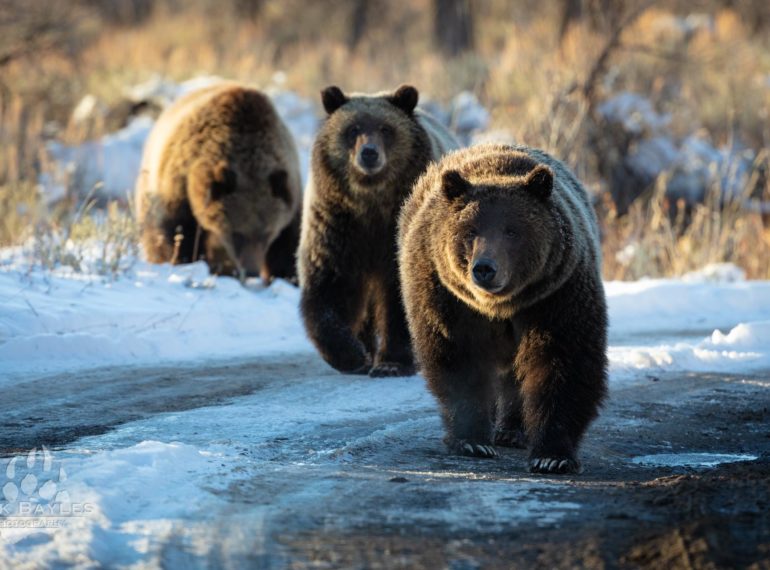Wyoming Wildlife Advocates and our conservation partners received a formal denial of our petition to require hunters to carry bear spray in known grizzly bear territory from the Idaho Fish and Game (IDFG) Commission. Reasons cited included the requirement is “not warranted for every hunter,” and that it would “create a burdensome regulation, and is not an enforcement priority.” The Commission believes that voluntary education is the best way to increase safety rather than requiring another law or regulation. The IDFG Commission claims that educational efforts are sufficient, working and that they will continue to focus on education around bear safety. While we support educational efforts to inform the public about bear safety when recreating outdoors, there are many who choose not to carry bear spray even though it is the most efficacious method of preventing injury to people and bears. Hunters who were in attendance at our protest against trophy hunting confirmed that they are unwilling to carry bear spray and only rely on their weapons as a suitable defense against grizzly bears. Clearly, there is a disconnect in the messaging the Wyoming Game and Fish Department claims they are touting to hunters and what hunters actually perceive. In 2018, a record number of bears were killed in the Greater Yellowstone Ecosystem (GYE) due to conflicts with hunters. Education efforts are falling short if people and bears are still coming into conflict.
The IDFG Commission made a point in their denial letter of stating that they believe the number of grizzly bears increasing “well beyond the vision of recovery in federal recovery plans” is the primary cause of “increased encounters between humans and bears.” Continuously, scientists have pointed out that the increase in conflicts is due to depletion of food sources within the GYE which is requiring the bears to wander farther out to find quality sustenance. They often turn to both gut piles left by hunters as well as livestock and other human foods.
Most recently, Dr. Barrie Gilbert, Emeritus Faculty at Utah State University and bear expert, testified in a Congressional hearing on House Resolution 2532, a bill sponsored by the Chairman of the House Natural Resources Committee, Raul Grijalva. House Resolution 2532, also known as the “Tribal Heritage and Grizzly Bear Protection Act” would require tribes who consider the grizzly bear to be sacred and a relative to have input on management decisions concerning the bears. It would also prohibit the trophy hunting of grizzly bears. Dr. Gilbert has every reason to hate bears as he was attacked when he surprised a sow in Yellowstone National Park in the late 1970s. In the attack, he lost an eye and was severely injured by the bear. Instead, Dr. Gilbert has become an outspoken proponent of protecting grizzlies. He has immersed himself in the science of bear/human conflicts and become an expert on grizzlies in the U.S. and the Canadian Rockies, British Columbia, and Alaska. Dr. Gilbert testified that,
“The fact that all four of the Yellowstone grizzly primary foods are threatened causes many scientists, myself included, to be concerned about the short and long-term prospects of this important grizzly bear population. A major and significant consequence of the declines in the most energy-rich foods is the re-distribution of grizzly bears in the ecosystem and especially their emigration beyond the boundaries of protected areas.” Furthermore, Dr. Gilbert also stated, “since habitat productivity plays such a major role in determining productivity, condition, and ultimately survivorship of cubs of adult female grizzlies in the Yellowstone area, the impacts of hunting mainly male bears in a food-limited population needs attention. The cascading effects of deaths of adult males leading to a surge in subadult males increases sexually-selected infanticidal losses of young.”
Dr. Gilbert’s testimony clearly states that the quality and availability of food sources is the reason for increased distribution of bears, not that there are more bears. Other scientists, including Dr. David Mattson who served on the Interagency Grizzly Bear Study Team for more than two decades, agrees. The Yellowstone Ecosystem Subcommittee of the Interagency Grizzly Bear Committee is the only subcommittee not talking about food availability and its impacts on grizzly populations. In addition, the other threats that hunting this species will provide are real. Grizzlies are slow reproducers and as Dr. Gilbert pointed out killing older male bears will leave a gap open for younger subadult males who will kill off cubs at an increased rate.
With conflicts between hunters and grizzlies sure to continue under the current regime, we wonder how many more bears and people have to die in order for the states to step up and make this simple adjustment which is similar to requiring people to wear seat-belts or have a personal floatation device on the river. Time will tell. In the meantime, we will continue to encourage the states to do the right thing.
Idaho Bear Spray Petition Response
A similar petition was submitted to the Wyoming Game and Fish Commission but no response has yet been received.
Photo: Jack Bayles Photography

